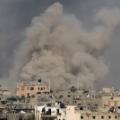We've wrapped up our live coverage for the day. You can read more about Russia's invasion of Ukraine here, or scroll through the updates below.
July 15, 2023 Russia-Ukraine war news
By Joshua Berlinger, Thom Poole, Adrienne Vogt and Matt Meyer, CNN
Kharkiv mayor says city hit by Russian missiles
From CNN’s Mariya Knight and Josh Pennington
Russian missiles have struck the city center of Kharkiv in the early hours of Sunday, according to the city's mayor Ihor Terekhov.
One of the strikes was recorded in the Shevchenkivskyi district and did not cause any damage, Terekhov said.
"As for the rest of the missile strikes, the State Emergency Service is inspecting the area. It is highly likely that Kharkiv was hit by S-300 missiles," he said, adding that there was no information about casualties at the moment.
Located in northeastern Ukraine, Kharkiv is the country's second-largest city and municipality and was considered a major target for the Russian military early in the invasion.
It's approaching midnight in Kyiv. Catch up on the day's events here
From CNN staff
While admitting Ukraine's counteroffensive is "slow" — with neither side making substantial advances on the ground — Kyiv said Western partners remain committed to its success on the heels of the NATO summit this week.
Meanwhile, the deadline to renew the Black Sea grain deal is fast approaching, with Russia signaling its reluctance to join again. The deal, which is viewed as vital to global food security, is set to expire on Monday.
Here are the latest developments:
On the battlefield: Russia is "investing everything" to stop Ukrainian forces on the southern and eastern front lines, according to Ukrainian President Volodymyr Zelensky. It's difficult to measure which side currently holds the upper hand in the absence of significant territorial gains by either, according to one analyst.
A Ukrainian commander in the south, Brig. Gen. Oleksandr Tarnavsky, said that his troops were putting the pressure on Moscow's forces and destroying equipment. In the east, a Ukrainian military spokesperson said Kyiv's forces are storming the positions of Russian troops near Bakhmut. And a bit further north, Russia seems to be renewing firepower between the towns of Lyman and Kupyansk.
Patience will pay off, in Kyiv's view: Senior Ukrainian officials and generals alike continue to describe tough fighting and limited progress as they look to drive Russian forces out of the country and turn the tide of the war.
Speaking to journalists Friday in Kyiv following his attendance at the NATO summit, the head of the Office of the President of Ukraine, Andriy Yermak, admitted the counteroffensive — seen as being underway since the start of June — was “hard work.”
“It’s not going that fast; it is slow,” he said, adding that it is important Ukrainians are told the truth about developments on the ground.
Asked by CNN if Ukraine’s Western allies were looking for quick results, Yermak said there was no such pressure from partner countries.
Grain deal deadline looms: Russian President Vladimir Putin has threatened to let the Black Sea grain deal expire Monday if his demands are not met. According to the Kremlin, Putin and South African President Cyril Ramaphosa talked by phone about the initiative on Saturday. Experts say prices would rise if the grain deal is not renewed.
South Korean president meets with Zelensky: South Korea's President Yoon Suk Yeol made a surprise visit to Ukraine on Saturday for talks with his Ukrainian counterpart. Yoon visited the site of the massacre in Bucha near Kyiv and pledged to increase assistance to Ukraine to $150 million this year. South Korea has repeatedly maintained its stance not to supply lethal weapons to Ukraine since Russia's invasion.
Wagner fighters in Belarus: Members of the private military group are in neighboring Belarus, according to Andrii Demchenko, a spokesperson for the State Border Guard Service of Ukraine. On Friday, the Belarusian defense ministry announced that Wagner fighters are training Belarusian troops near the town of Osipovichi, about 90 kilometers (56 miles) south of the capital Minsk. After the group's short-lived rebellion in Russia about three weeks ago, Belarusian leader Alexander Lukashenko had asked fighters from Wagner to come to his country to train members of the Belarusian military.
Could Ukraine be getting ATACMS next?: Presidential aide Yermak told journalists in Kyiv he believed the Biden administration was “very close” to making a decision on approving the transfer of Army Tactical Missile Systems (ATACMS) to its arsenal of weapons. But Yermak stressed that a final decision had not yet been made.
Ukrainian leaders have had ATACMs close to the top of their wish list since the early months of the war. The US-manufactured guided missile has a range of up to 300 kilometers (about 186 miles).
Fierce fighting continues in southern and eastern Ukraine — here are the areas each side controls
Ukraine's summer counteroffensive is, by its own accounts, a grueling slog.
Recaptured territory has not come easily in areas of southern and eastern Ukraine where Russia has created multi-layered defenses and heavily mined the land.
As has been the case for months, some of the fiercest fighting is centered on the eastern city of Bakhmut. The Russian private military group Wagner claimed it captured the city and handed it over to Moscow's troops back in May, but in the time since, Ukraine has consistently reported modest gains in areas immediately surrounding Bakhmut.
Meanwhile, one of Kyiv's most important strategic priorities can be found on the southern front. Analysts view reclaiming Russian-occupied parts of the Zaporizhzhia region as critical to the Ukrainian counteroffensive, because it could break Russia's land bridge between annexed Crimea and the eastern Donetsk region — effectively separating the route between the territory Russia seized in 2014 and its new incursions in eastern Ukraine.
The map below shows the latest state of control for both militaries:

Analysis: Inside the communications war at this week's NATO summit
Analysis from CNN's Luke McGee
This week’s NATO summit in the Lithuanian capital of Vilnius provided a valuable reminder that during a war, the battle for communications is as important as anything happening on the ground.
On its own terms, the summit was a success: The main goals in Vilnius were to reach an agreement that Sweden could join the security alliance – which Turkey had blocked – and to strengthen support for Ukraine.
But officials at NATO headquarters in Brussels have expressed some frustrations that much of the coverage focused on the specific and thorny issue of Ukraine joining the alliance.
US President Joe Biden's timing of saying that Ukraine could not be admitted to NATO while war was raging on its territory — and then Ukrainian President Volodymyr Zelensky's blistering tweet criticizing NATO as “absurd” for not offering a clearer path to membership — gave Russia room to call the summit a failure.
One example: Sputnik, the Russian state-owned news agency, was able to publish a story headlined “NATO Summit Exposes Fractures in Alliance Over Support for Ukraine.” The article contains a quote from an analyst stating that “the decision by the USA to quietly pull the plug on the Ukrainians is only natural and certainly not ‘absurd.’ The game is up.”
Given the millions of dollars the US and its allies have provided to Ukraine since the start of the war and the commitment to send even more money and arms, this is a dubious claim. But Biden’s comments, combined with Zelensky’s public anger, provided space for the claim to be made.
“There were two major communications missteps ahead of Vilnius,” Brett Bruen, a former US diplomat who worked for the Obama administration, told CNN. “The first was the announcement of the US sending cluster munitions when other allies won’t. It created an unnecessary delineation between America and the others. The second was even raising the question of Ukraine’s immediate membership, which was never on the cards, but came to dominate the meeting.”
A senior NATO official told CNN that Biden’s comments were “not helpful” at a time when the bloc is in a “comms war” with Russia.
A Western diplomat also told CNN that NATO desperately needs to “fix and double down on a communication strategy to explain all the good things we are doing.” The fear of this diplomat, and of others who spoke with CNN, is that NATO “cannot win the communication war on membership that Russia wants to turn this into. There isn’t anything feasibly more we could have done on Ukraine’s membership at this time.”
This might feel like nitpicking over things that are trivial while a nation is under invasion. But Russia has historically been better than the West at spinning events to fit a narrative. These information wars are not just for the benefit of Russian audiences at home, but for people who live in NATO territories who might be susceptible to misinformation.
Putin holds call with South African president about grain deal as deadline looms
From CNN's Uliana Pavlova
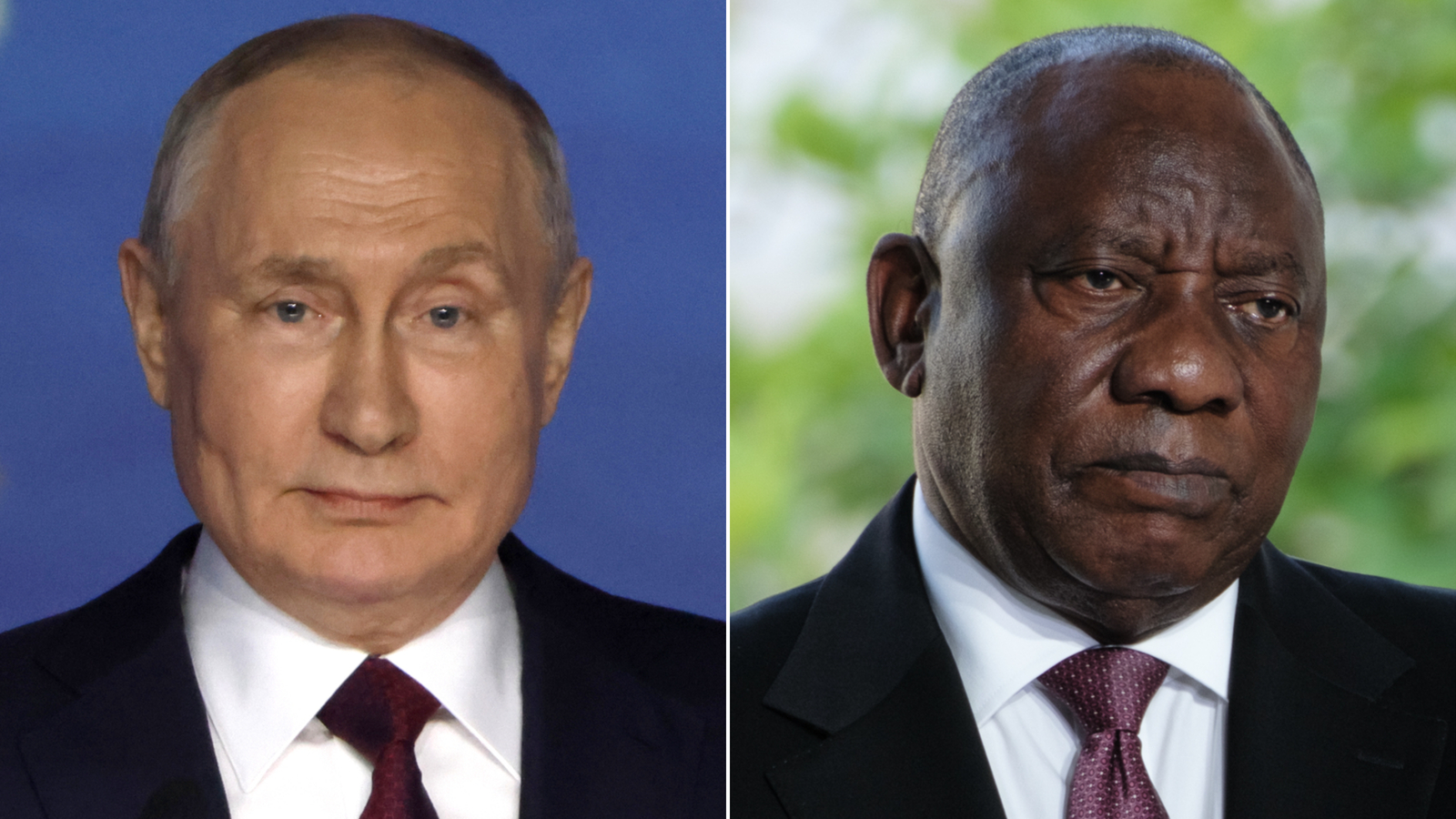
Russian President Vladimir Putin and South African President Cyril Ramaphosa talked by phone Saturday about the soon-expiring deal that allows grain to be exported from Ukrainian ports in the Black Sea.
While global food supplies are not as tight as they were last year, traders say prices would rise if the Black Sea grain deal is not renewed — and Putin has threatened to let the deal expire Monday if his demands are not met.
Though Russia has renewed the deal three times, it has repeatedly complained that a separate agreement with the United Nations to facilitate shipments of Russian fertilizers and grain, which was brokered as part of the package last July, has not yielded results.
On the call with Ramaphosa, “Putin stressed that the obligations set out in the relevant Russia-UN memorandum to remove obstacles to the export of Russian food and fertilizers still remain unfulfilled,” according to a Kremlin readout.
“Moreover, the main goal of the deal, namely the supply of grain to countries in need, including those on the African continent, has not been realized,” it said.
United Nations Secretary-General António Guterres sent a letter to Putin this week outlining a proposal to keep the deal alive and seeking to address another key demand from Moscow — access to some of the international financial mechanisms that sanctions have cut it off from.
More background: The Black Sea grain deal was brokered by Turkey and the United Nations in July 2022 after Russia launched its full-scale invasion of Ukraine and blockaded its ports, sparking fears of a global famine. Proponents say it was vital to addressing world hunger, as Ukraine is one of the world’s leading grain exporters.
Summit approaches: Putin and Ramaphosa also agreed to hold a separate meeting at the upcoming BRICS summit — a meeting of leaders from Brazil, Russia, India, China and South Africa — for more discussion of the countries' direct relations and international priorities, the statement said.
The BRICS summit is scheduled for August 22-24 in Johannesburg, South Africa, but the Kremlin has yet to confirm whether Putin will attend in person.
CNN's Sophie Tanno and Tim Lister contributed to this report.
Heavy fighting continues in the south of Ukraine as neither side makes significant gains
From CNN's Andrew Carey and Yulia Kesaieva in Kyiv
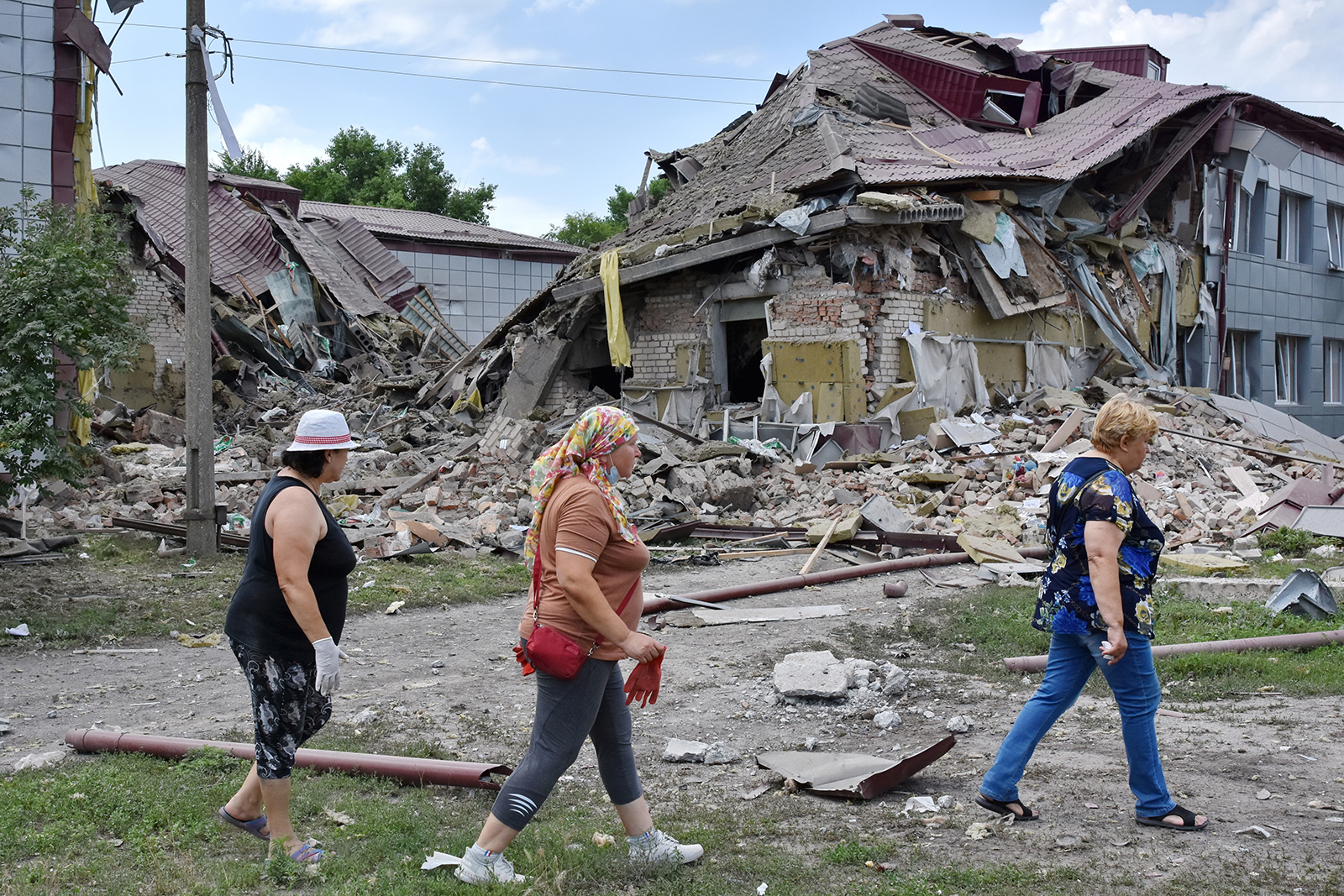
Along the southern front — seen as perhaps Ukraine’s main strategic priority, with the aim of breaking Russia’s land bridge to Crimea by punching through to the Sea of Azov — reports continue to suggest Ukrainian and Russian forces involved in very heavy fighting.
Brig. Gen. Oleksandr Tarnavsky, commander of the Tavria Joint Forces Operation that is operating on a large section of the southern Ukraine front, told Ukrainian television Saturday morning his soldiers were “systematically driving the enemy from their positions.”
He listed 33 pieces of Russian equipment destroyed in the latest Ukrainian attacks, including armored personnel carriers, artillery pieces and an anti-aircraft missile system, among others. Those encouraging words, from Ukraine’s perspective, are yet to translate into long lists of liberated towns and villages, however.
Russian military blogger Rybar also claimed further Ukrainian pressure on Russian positions near the Zaporizhzhia region village of Robotyne, which is south of Orikhiv in an area that has seen small gains by Ukrainian forces over the last week.
Which side has the advantage? Analyst Rob Lee, a senior fellow in the Foreign Policy Research Institute’s Eurasia Program, says it is difficult to measure which side currently holds the upper hand in the absence of significant territorial gains by either.
“Both sides are taking attrition right now … but it is not clear which side can sustain it better,” he told the Geopolitics Decanted podcast.
“On the Russian side, if they take enough losses and Ukraine can isolate parts of the front, (then Ukrainian forces) may be able to achieve a breakthrough. On the flip side, if Ukraine keeps taking losses and more attrition, the offensive might culminate too soon, before they make it to (Russia’s) main defensive lines, which lie another 10 to 15 kilometers (about 6 to 9 miles) to the south,” Lee said.
One part of Ukraine’s current campaign that does seem to be achieving tangible results is strikes on targets behind front lines. These are aimed at disrupting and degrading Russian supply lines as well as targeting Russian command bases and soldiers’ barracks.
In his comments Saturday morning, Tarnavsky told Ukrainian TV viewers that nine Russian ammunition depots had been destroyed in the last day. He did not say where the depots were located, but it is likely they were a substantial distance from the front lines.
Earlier this week, a senior Russian general was killed when a Ukrainian missile hit the base of Russia’s 58th Combined Arms Army in the occupied port city of Berdiansk.
Ukraine’s counteroffensive is "slow," but Western allies remain patient, Kyiv says
From CNN's Andrew Carey and Yulia Kesaieva in Kyiv
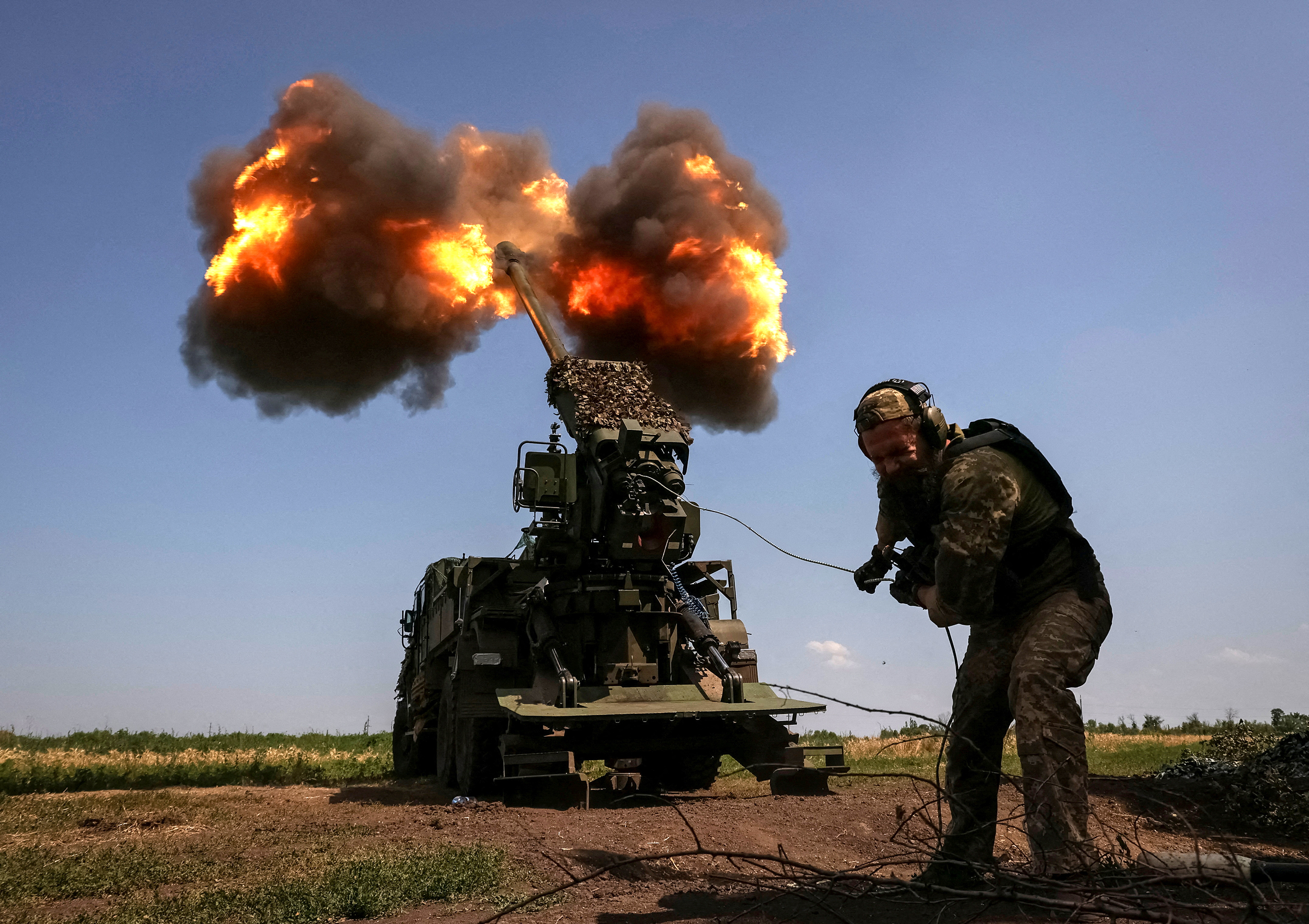
Senior Ukrainian officials and generals alike continue to describe tough fighting and limited progress on the battlefield as they look to drive Russian forces out of the country and turn the tide of the war.
Just days after Ukraine’s key partners met at the NATO summit in Lithuania, pledging even deeper security ties — albeit without specifying any timetable for Ukraine's potential membership in the alliance — Kyiv insists it does not feel under pressure to deliver quick results.
Counteroffensive is "slow": Speaking to journalists Friday in Kyiv following his attendance at the NATO summit, the head of the Office of the President of Ukraine, Andriy Yermak, admitted the counteroffensive — seen as being underway since the start of June — was “hard work.”
“It’s not going that fast; it is slow,” he said, adding that it is important Ukrainians are told the truth about developments on the ground.
Asked by CNN if Ukraine’s Western allies were looking for quick results, Yermak said there was no such pressure from partner countries. Instead, he said, they just ask: "What else do you need to expedite victory?"
Near Bakhmut: One of the more encouraging areas for Ukraine’s offensive appears to be around the battered city of Bakhmut in the east, though without any reports of significant breakthroughs.
“The Bakhmut direction remains one where our defense forces have the initiative. Our defense forces are pushing the enemy on the southern and northern flanks, storming their positions,” military spokesperson Serhii Cherevatyi said on Ukrainian television Saturday, adding that “the enemy is putting up fierce resistance.”
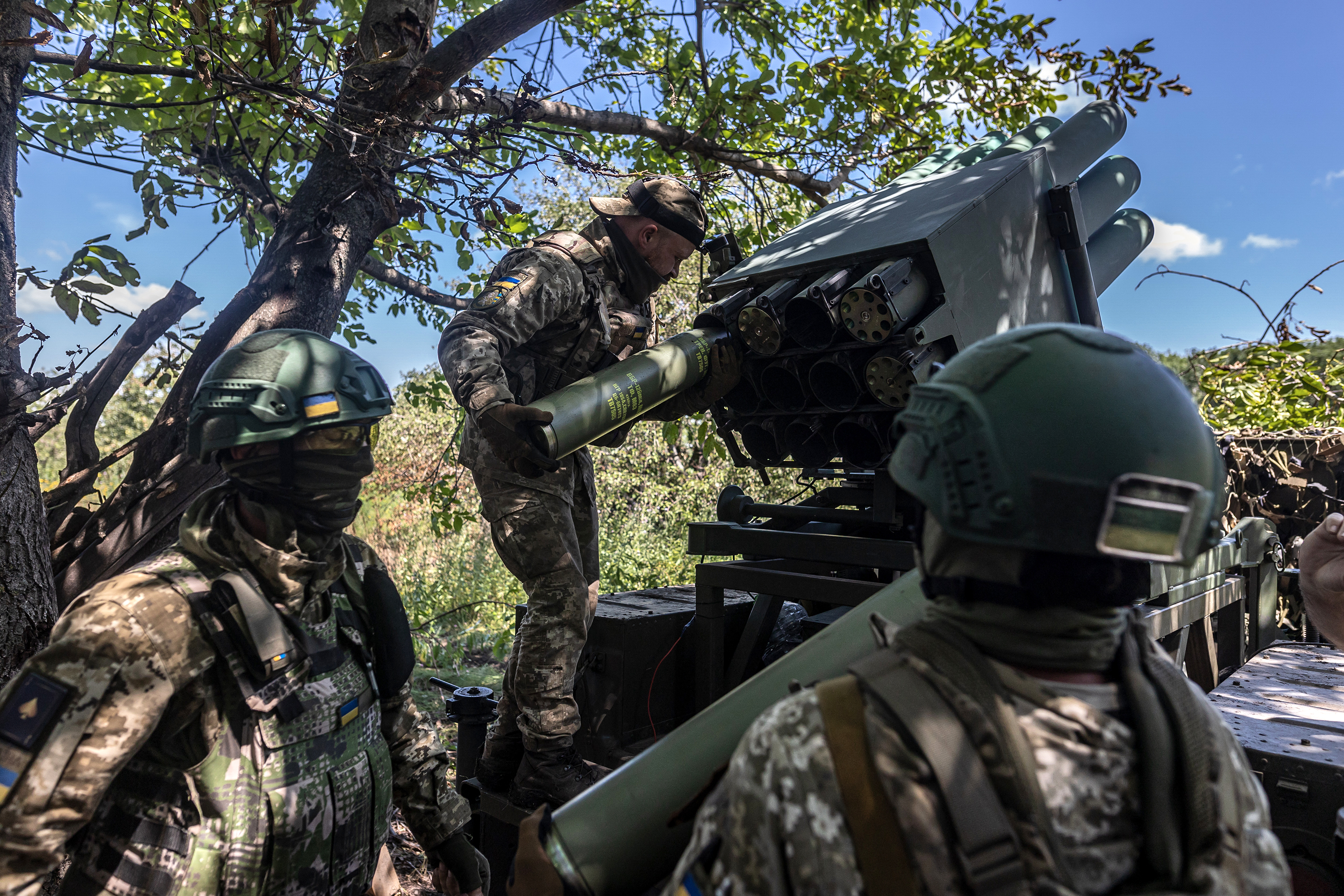
Mapping by DeepStateMap.Live, which updates changes on the ground daily and is widely used by analysts, has suggested almost no shifts in the front line around the city for many days, even as Ukrainian forces continue efforts to regain villages like Klishchiivka to the southwest and Berhivka to the northwest, where fighting has raged for weeks.
Further to the north, in the roughly 100-kilometer (about 62-mile) stretch of land between the towns of Lyman and Kupyansk, Cherevatyi said Russian forces were “actively attacking.”
The area was held by Russia for almost six months last year before being recaptured in a Ukrainian offensive in October; in recent weeks, it has become a renewed focus of Russian firepower.
“This direction is the leader in the (Russian) use of artillery, mortars and multiple rocket launchers shelling. The enemy carried out 570 attacks and 11 air raids over the last day,” Cherevatyi said.
What Russian accounts say: According to Russian military bloggers, one of the areas where Moscow’s forces have been concentrating their efforts is around the village of Novoselivske in northeastern Ukraine. On Telegram, the popular Rybar account described Russian advances through forested areas to the south of the village, as well as the digging of a new defensive line close to a nearby railway line.
It is not possible for CNN to immediately verify claims of territorial gains or losses by either side.
South Korea's president meets with Zelensky following Bucha visit
From CNN's Yulia Kesaieva and Radina Gigova
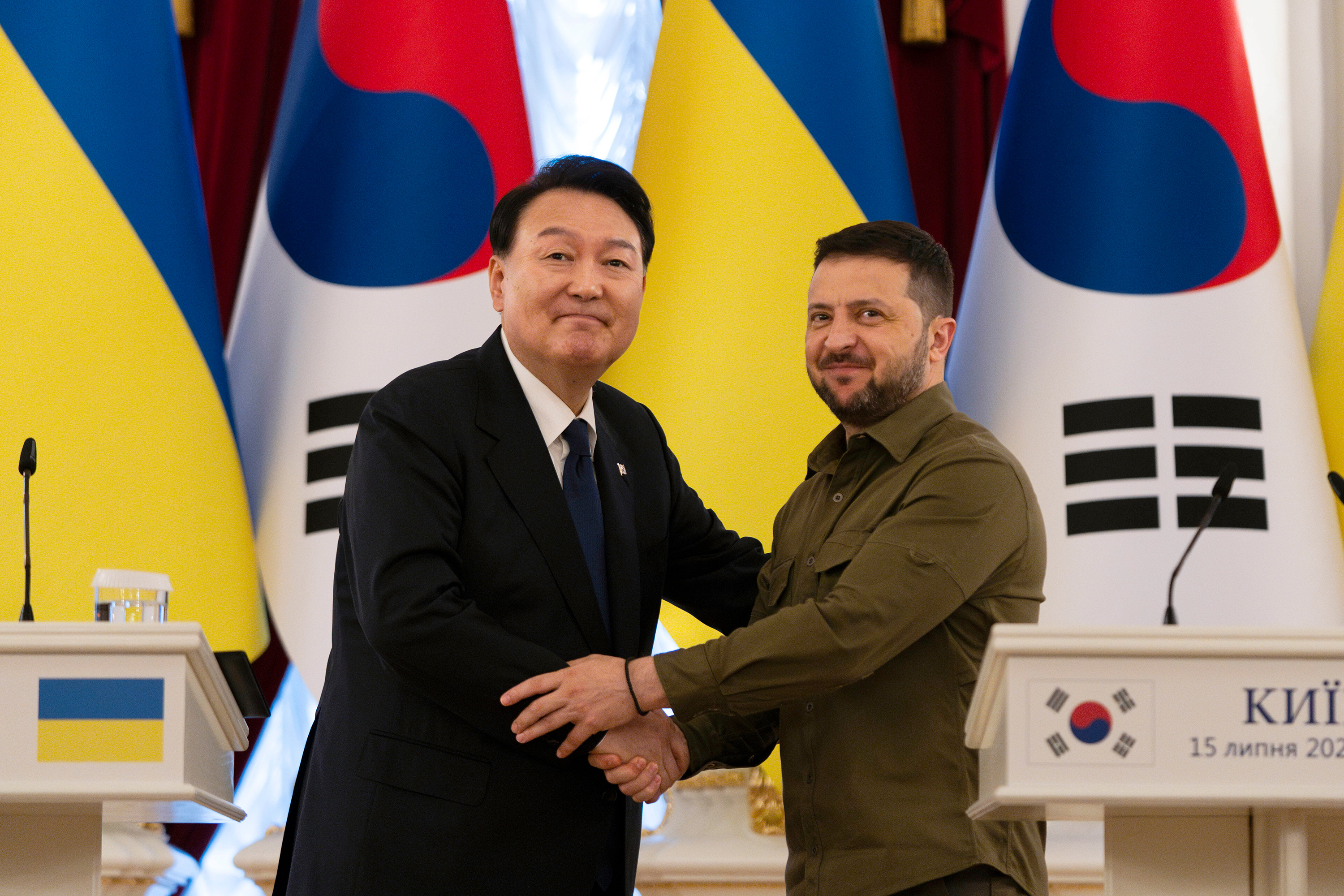
South Korea's President Yoon Suk Yeol and first lady Kim Keon Hee met with Ukrainian President Volodymyr Zelensky and first lady Olena Zelenska during a surprise visit to Ukraine on Saturday, Zelensky said in a message on Twitter.
"During this visit, the first in the history of our relations, we are discussing everything that is important for the normal and safe life of people, for the rules-based international order," Zelensky said.
They also discussed the deportation of Ukrainians to Russia, his 10-step peace formula and a global peace summit, food and energy security, and economic cooperation, according to the Ukrainian president.
"I am sure together we will give more strength to our nations and the global positions of Ukraine and the Republic of Korea," Zelensky said.
South Korea has pledged to increase its assistance to Ukraine from $100 million to $150 million this year, the leaders announced at a news conference after their meeting. Zelensky said Seoul is sending Ukraine special-purpose vehicles and equipment, including machines for removing landmines.
South Korea will also continue helping with various recovery efforts, including the rebuilding of schools, hospitals, homes and businesses, the Ukrainian president said.
Earlier Saturday, Yoon visited Bucha — the town just north of Kyiv that has become synonymous with Russian atrocities and alleged war crimes — and met with Ukraine's Prosecutor General Andriy Kostin.
"Ukraine is grateful to South Korea for its support in the international arena, namely in the UN and for backing President Zelensky's Peace Formula," Kostin said in a post on Twitter. "Thanked President Yoon Suk Yeol for his stance in support of Ukraine, emphasizing that the international community must not tolerate large-scale attacks against civilians."
Kostin said they visited Bucha "to see the aftermath of Russia's atrocious policy of targeting Ukrainian civilians."
"In 33 days of occupation, Bucha has faced brutal war crimes, including torture, shooting civilians and evacuating vehicles, conflict-related sexual violence," Kostin said. "The Kremlin regime must be held accountable for these atrocities and the most effective way to achieve this is through the Special Tribunal for the Crime of Aggression."
